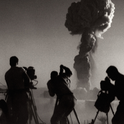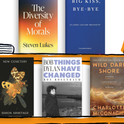© Annie Cavanagh, Wellcome Images
There’s an old joke in the healthcare profession that makes fun of a tendency among cancer specialists to pursue “treatment at all costs”: “Why do they put nails in coffins? To stop oncologists having one last try…”
If his latest book is anything to go by, Karol Sikora, an outspoken oncologist, is unlikely to lay the cliché to rest. Entitled How to Beat Cancer, and self-published in e-book form, it contains useful and practical advice about how to maximise the often labyrinthine and not always equitable NHS system, and plenty of expert (if sometimes indigestibly dense) details on the latest developments in treatment. For all this, however, How to Beat Cancer seems to me to embody a single, largely unexamined assumption: that every cancer patient should seek out every single drug that might give him or her another drop of life.
Now, this may be true for some people. I remember some patients I cared for while working in oncology as a junior doctor—a 20-year-old girl dying of colorectal cancer, for example—to whom I might certainly have recommended this book as an aid to navigating the NHS. Sikora is a vocal critic of the lack of availability of cancer treatments in the NHS, and runs a private service providing cutting-edge radiotherapy. It is easy to see how this may be informed by a strong desire to provide the “best” possible treatment for each patient. What I find jarring within Sikora’s account, however, is the presumption that, were I to be diagnosed with cancer tomorrow, my only rational and “best” course of action would be to extract the maximum possible quantity of treatment out of the health service, no matter what the cost.
This may be excellent advice for some people. But it seems to me that such an account gives too little weight to the ways in which quality of life, rather than simply quantity, can be vital to cancer patients. And its implication that suffering from cancer necessarily trumps every other value in your life, and that “beating” the disease, as Sikora’s title has it, should suddenly become the single dominant theme of your existence, feels far too narrow an account of coping with illness to encompass the full gamut of human experience.
If I were faced with a cancer diagnosis myself tomorrow, I might feel differently. Yet another, very different book about cancer, recently written by a doctor, gives some hope that broader perspectives exist, other than simply those that Sikora puts forth.
The Other Side by Kate Granger is a moving personal account of how, as a young doctor diagnosed with terminal ovarian cancer, the author eventually decided not just to stop treatment, but to go back to work in her final months of life. Not everyone would make the same decisions as Granger. But the optimism and focus on life found in her book provides an inspiring, necessary counterbalance to the nuts and bolts of Sikora’s account, in which science inexorably “battles” disease, and medical expertise is the predominant guiding force. In How to Beat Cancer, death is barely mentioned.
At its best, Sikora’s book makes a strong case that patients need to be much more informed about their cancer and their care than they are today, and the health service is moving towards this principle. His checklists of questions to ask about treatments such as chemotherapy and radiotherapy are concise and comprehensive, and his description of the molecular basis of cancer is helpful and accessibly written.
Unfortunately, the book is elsewhere likely to prove difficult for ordinary readers, straying into reams of jargon that seem aimed not at patients but fellow professionals. Sikora assumes that patients need scientific and technical information and this is what he offers. What he doesn’t address, however, are the mundane but often more frightening questions that many patients ask about the actual experience of their treatment: is radiotherapy painful? Will I become radioactive and be unable to play with my children?
This book focuses on the harder-edged, medical aspects of cancer, which makes me feel that How to Beat Cancer is ultimately a missed opportunity. If you’re facing a terrifying cancer diagnosis and you want to know how you can maximise your chances of getting access to medications and treatments not commonly available in the NHS, then this book, in parts, may be helpful. But given the quality of the freely available online resources that already exist around cancer (the Macmillan website, which Sikora notes in a useful appendix, is especially valuable), it is difficult wholeheartedly to recommend it. Aiming to beat cancer is all very well: but asking what it means to live with it in a broader sense, or to die of it with dignity, is largely beyond the scope of this particular account.
There’s an old joke in the healthcare profession that makes fun of a tendency among cancer specialists to pursue “treatment at all costs”: “Why do they put nails in coffins? To stop oncologists having one last try…”
If his latest book is anything to go by, Karol Sikora, an outspoken oncologist, is unlikely to lay the cliché to rest. Entitled How to Beat Cancer, and self-published in e-book form, it contains useful and practical advice about how to maximise the often labyrinthine and not always equitable NHS system, and plenty of expert (if sometimes indigestibly dense) details on the latest developments in treatment. For all this, however, How to Beat Cancer seems to me to embody a single, largely unexamined assumption: that every cancer patient should seek out every single drug that might give him or her another drop of life.
Now, this may be true for some people. I remember some patients I cared for while working in oncology as a junior doctor—a 20-year-old girl dying of colorectal cancer, for example—to whom I might certainly have recommended this book as an aid to navigating the NHS. Sikora is a vocal critic of the lack of availability of cancer treatments in the NHS, and runs a private service providing cutting-edge radiotherapy. It is easy to see how this may be informed by a strong desire to provide the “best” possible treatment for each patient. What I find jarring within Sikora’s account, however, is the presumption that, were I to be diagnosed with cancer tomorrow, my only rational and “best” course of action would be to extract the maximum possible quantity of treatment out of the health service, no matter what the cost.
This may be excellent advice for some people. But it seems to me that such an account gives too little weight to the ways in which quality of life, rather than simply quantity, can be vital to cancer patients. And its implication that suffering from cancer necessarily trumps every other value in your life, and that “beating” the disease, as Sikora’s title has it, should suddenly become the single dominant theme of your existence, feels far too narrow an account of coping with illness to encompass the full gamut of human experience.
If I were faced with a cancer diagnosis myself tomorrow, I might feel differently. Yet another, very different book about cancer, recently written by a doctor, gives some hope that broader perspectives exist, other than simply those that Sikora puts forth.
The Other Side by Kate Granger is a moving personal account of how, as a young doctor diagnosed with terminal ovarian cancer, the author eventually decided not just to stop treatment, but to go back to work in her final months of life. Not everyone would make the same decisions as Granger. But the optimism and focus on life found in her book provides an inspiring, necessary counterbalance to the nuts and bolts of Sikora’s account, in which science inexorably “battles” disease, and medical expertise is the predominant guiding force. In How to Beat Cancer, death is barely mentioned.
At its best, Sikora’s book makes a strong case that patients need to be much more informed about their cancer and their care than they are today, and the health service is moving towards this principle. His checklists of questions to ask about treatments such as chemotherapy and radiotherapy are concise and comprehensive, and his description of the molecular basis of cancer is helpful and accessibly written.
Unfortunately, the book is elsewhere likely to prove difficult for ordinary readers, straying into reams of jargon that seem aimed not at patients but fellow professionals. Sikora assumes that patients need scientific and technical information and this is what he offers. What he doesn’t address, however, are the mundane but often more frightening questions that many patients ask about the actual experience of their treatment: is radiotherapy painful? Will I become radioactive and be unable to play with my children?
This book focuses on the harder-edged, medical aspects of cancer, which makes me feel that How to Beat Cancer is ultimately a missed opportunity. If you’re facing a terrifying cancer diagnosis and you want to know how you can maximise your chances of getting access to medications and treatments not commonly available in the NHS, then this book, in parts, may be helpful. But given the quality of the freely available online resources that already exist around cancer (the Macmillan website, which Sikora notes in a useful appendix, is especially valuable), it is difficult wholeheartedly to recommend it. Aiming to beat cancer is all very well: but asking what it means to live with it in a broader sense, or to die of it with dignity, is largely beyond the scope of this particular account.











